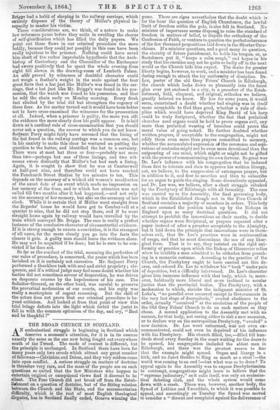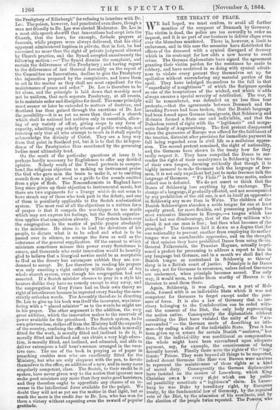THE BROAD CHURCH IN SCOTLAND. game. There are signs nevertheless
that the doubt which is for the hour the question of English Churchmen, the lawful limit of freedom within the pule, is also felt in Scotland. No minister of importance seems disposed to raise the standard of freedom in matters of belief, to dispute the orthodoxy of the Confession of Faith, or venture to question the perfectooherenco of the few thousand propositions laid down in the Shorter Cate- chisms. If a minister questions, and a good many do question, the eternity of future punishment, he holds his tongue, or, as • Sootchmen put it, " keeps a calm sough," and hopes in his study that his enemies may not be quite so badly off in the next world as the Church bids him expect. The desire for greater liberty begins, however, to work, and a minister has been found daring enough to attack the icy uniformity of discipline. Dr. Lee, pastor of the old Grey Friars' Church in Edinburgh, the church which looks down so pleasantly into the finest glen ever yet enclosed in a city, is a preacher of the Estab- lishment, bold, eloquent, and original, orthodox we believe, greatly beloved we know. He has for some years, it would seem, entertained a doubt whether bad singing was in itself more acceptable to God than good, whether a rule of disci- pline which would have deprived King David of his harp could be truly Scriptural, whether the fact that prelatical churches used organs could be held to prove organs evil, any more than prelatical wearing of breeches could prove the moral value of going naked. He further doubted whether written,prayers, if acceptable to the congregation, might not edify them even moro than prayers committed to memory, whether the accumulated expression of the reverence and aspi- rations of centuries might not be even more devotional than the outpouring of one mind, which might or might not be gifted with the power of communicating its own fervour. So great was Dr.. Lee's influence with his congregation that lie induced them first to tolerate and then to approve his written liturgy, not, we believe, to the suppression of extempore prayer, but in addition to it, and first to sanction and then to subscribe for an organ to guide the singing. Some dissentients appealed, and Dr. Leo was, we believe, after a short struggle rebuked by the Presbytery of Edinburgh with all formality. The case was carried up to the Assembly, the final governing body, which in the Established though• not in the Free Church of Scotland contains a majority of members in orders. This body at once assumed the position taken up by the Bishops in England upon so many doctrinal questions. It did not attempt to prohibit the innovations on their merits, to decide whether organs were Scriptural, or prayers repeated after it paper instead of after a preacher acceptable to the Almighty, but it laid down the principle that innovations were in them- selves evil, that Dr. Lee's practices were in contravention of usage, and that he must discontinue the use of any litur- gical form. That is to say, they insisted on the rigid uni- formity of practice upon which the Bishop of Gloucester relies when he inhibits a man admitted to be orthodox from preach- ing in a monastic costume. According to the practice of the Church, the Presbytery ought to have carried out this de- cree, and ordered Dr. Lee to withdraw his " book " under pain of deposition, but a difficulty intervened. Dr. Lee's character gives him immense influence with that body, which is, more- over, habitually more liberal and more inclined to secular justice than the provincial bodies. The Presbytery, with a moderation to which, shrieks the indignant minister of St. Luke's, "no parallel ever occurred except in Governments in the very last stage of decrepitude," evaded obedience to the order, actually " connived " at the resolution of the people of the Old Grey Friars' Church to do on such matters as they chose. A second application to the Assembly met with no success, for that body, not caring either to risk a now secession, or to declare war on the metropolitan Presbytery, "evaded" a new decision. Dr. Lee went unharmed, was not even ex- communicated, could not even be deprived of his influence with his Presbytery. His church filled, too,—filled till hun- dreds stood every Sunday in the court waiting for the doors to be opened, his congregation included the ablest men in Edinburgh, and there was the greatest reason to fear that the example might spread. Organ and liturgy in a kirk, and no Janet Geddes to fling so much as a stool !—the world was coming to an end !—but what was so be done ? To appeal again to the Assembly was to expose Presbyterianism to contempt, congregations might learn to believe that the. " supreme judicatory," as it calls itself, was only an ecclesias- tical debating club, and the whole system would come down with a crash. There was, however, another body, the Synod of Lothian and Tweeddale, to which it was possible to appeal, and accordingly on Tuesday the Synod was moved to consider a " dissent and complaint against the deliverance of the Presbytery of Edinburgh" for refusing to interfere with Dr. I THE TREATY OF PEACE.
bodies must ultimately tend. and. the Germans have shown in the treaty how far they perhaps hardly necessary for Englishmen to offer any decided render the right of their countrymen in Schleswig to the use the congregation of Grey Friars had on their own theory no Again, Schleswig, it was alleged, was a part of Hel- right of interference because ho repeated every Sunday the same stein, formed with it an indivisible State which it was not strictly orthodox words. The Assembly therefore in directing competent for Germans to forget except under the pres- Dr. Lee to give up his book was itself the innovator, was inter- sure of force. It is also a law of Germany that IL) ter- feting with a " placed minister" as to the words he might use ritory belonging to the Confederation can be ceded with- in his prayer. The other argument is the addition, the very out the consent of the Diet, the only body representing great addition, which the innovation makes to the reservoir of the nation entire. Consequently the diplomatists without power available for the priesthood. The Scotch system, to its consulting the Diet have violated the unity of the " s2a- own grievous loss, strikes off from the Ministry half the capacity surrounded " — the German mode of describing an isth- of the country, confining the office to the class which is morally mus_by ceding a slice of the indivisible State. True it has fitted for the work, is morally fitted and inclined to do it, is been given up in return for certain Danish "enclaves," but morally fitted and inclined and can obtain a very high educe- then, if the indivisibility was conditional on compensation tion, is morally fitted, and inclined, and educated, and able to the whole might have been surrendered upon adequate deliver extempore a half hour's sermon arranged in the voca- payment, say, for example, the consciousness of being tive case. The use of the book in praying as of paper in decently honest. Finally there were the rights of the " legi- preaching enables men who • are excellently fitted for the timate " Prince. They were beyond all things to be respected, Ministry, but who are only eloquent with the pen, to devote indeed decent Germans like Herr von Bunsen were anxious themselves to the office, an addition of a new, and in many cases to represent the maintenance of these rights as a kind singularly competent, class. The Scotch, to their credit be it of sacred duty. Consequently the German diplomatists spoken, have never given way to the notion that ignorant men have insisted on the cession of Lauenburg, which King make good ministers any more than they make good banisters, Christian owe b - every right which can by politi- and they therefore ought to appreciate any chance of an in- cal possibility constitute a " legitimate" claim. In Lauen- crease in the intellectual force available for the pulpit. We burg he was Duke by hereditary right, by European doubt they will not as yet see the matter in that light, but so treaty, by the fundamental law of Germany, by the repeated much the more is the credit due to Dr. Lee, who has won for vote of the Diet, by the admission of his assailants, and by them a victory without expecting even the reward of popular who































 Previous page
Previous page